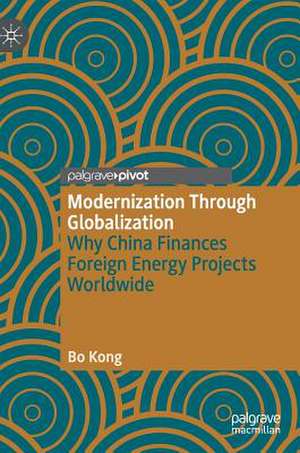Modernization Through Globalization: Why China Finances Foreign Energy Projects Worldwide
Autor Bo Kongen Limba Engleză Hardback – 17 ian 2019
Preț: 382.95 lei
Nou
Puncte Express: 574
Preț estimativ în valută:
73.30€ • 79.65$ • 61.61£
73.30€ • 79.65$ • 61.61£
Carte tipărită la comandă
Livrare economică 21 aprilie-05 mai
Preluare comenzi: 021 569.72.76
Specificații
ISBN-13: 9789811360152
ISBN-10: 9811360154
Pagini: 103
Ilustrații: XIII, 103 p. 3 illus., 2 illus. in color.
Dimensiuni: 148 x 210 x 14 mm
Greutate: 0.3 kg
Ediția:1st ed. 2019
Editura: Springer Nature Singapore
Colecția Palgrave Pivot
Locul publicării:Singapore, Singapore
ISBN-10: 9811360154
Pagini: 103
Ilustrații: XIII, 103 p. 3 illus., 2 illus. in color.
Dimensiuni: 148 x 210 x 14 mm
Greutate: 0.3 kg
Ediția:1st ed. 2019
Editura: Springer Nature Singapore
Colecția Palgrave Pivot
Locul publicării:Singapore, Singapore
Cuprins
Acknowledgements.- Chapter 1: Introduction.- Chapter 2: Globalization of Chinese Development Finance for Energy.- Chapter 3: Drivers Behind Chinese Development Finance for Energy Worldwide.- Chapter 4: State Control.- Chapter 5: Capital Mobilization.- Chapter 6: Conclusion.- Bibliography.
Notă biografică
Bo Kong is Associate Professor and the ConocoPhillips Chair of Chinese and Asian Studies of the David L. Boren College of International Studies at the University of Oklahoma. He authored China’s International Petroleum Policy (2009) and edited Energy Security Cooperation in Northeast Asia (2015).
Textul de pe ultima copertă
This pivot considers how China deals with the globalization of its energy companies in the face of global efforts to combat climate change. It examines how China, following its emergence as the world’s largest energy consumer and its resultant growing dependence on foreign energy, engages the world on energy, and its implications for global governance of energy. It notably focuses on the policy impact of China’s global engagement for the accelerated “going out” strategy and the so-called “one belt one road” (OBOR) initiative, and profound climate implications for the rest of the world, contending that the type of energy services, technologies, and infrastructure China finances around the globe today will determine the global community’s carbon footprint in the foreseeable future.
Caracteristici
Examines China’s place in the global energy market Considers how China’s energy engagement will impact on global efforts to combat climate change Addresses the evolution of China’s policies and governance of the energy market
